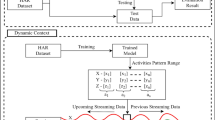Abstract
In the past few decades, lots of studies were proposed on investigations of brain circuits for physical health, mental health, educational learning, controlling system and so on. However, very few studies concentrate their attention on contextual brain recognition. Actually, the brain neural system is the main bridge between mental senses and physical behaviors, and the mental senses such as emotions and preferences are heavily impacted by the context, which can be represented by the brain signals. Hence, how to recognize the contextual brain signal for mental senses is the aimed issue of this paper. To deal with this issue, in this paper, we examine a number of machine learning methods on a real dataset, including traditional classifiers and LSTM (Long Short-Term Memory Neural Network). Also, a free Convolutional Neural Network called BrainCNN is proposed to recognize the contextual brain signal using a mobile brain-signal detection device. Through the brain-signal recognition, the context can be identified and thereby facilitates the prediction of mental senses in the future. The experimental results show the proposed BrainCNN is more promising than the other methods in recognizing the context brain signal. Further, this work provides a basic idea for future interests in investigating the contextual brain.
Access this chapter
Tax calculation will be finalised at checkout
Purchases are for personal use only
Similar content being viewed by others
References
Al-Shoukry, S., Rassem, T.H., Makbol, N.M.: Alzheimer’s diseases detection by using deep learning algorithms: a mini-review. IEEE Access 8, 77131–77141 (2020)
Finnegan, S.L., Browning, M., Duff, E., et al.: Brain activity measured by functional brain imaging predicts breathlessness improvement during pulmonary rehabilitation. Thorax (2022). https://doi.org/10.1136/thorax-2022-218754
Gallego, J.A., Makin, T.R., McDougle, S.D.: Going beyond primary motor cortex to improve brain–computer interfaces. Trends Neurosci. 45(3), 176–183 (2022)
Jamil, N., Belkacem, A.N., Lakas, A.: On enhancing students’ cognitive abilities in online learning using brain activity and eye movements. Education and Information Technologies (2022). https://doi.org/10.1007/s10639-022-11372-2
Kim, B.J.: Music recommendation system for personalized brain music training research with jade solution company. Int. J. Advanced Smart Convergence 6(2), 9–15 (2017)
Koelsch, S.: Brain correlates of music-evoked emotions. Nat. Rev. Neurosci. 15, 170–180 (2014)
Kringelbach, M.L., Berridge, K.C.: The affective core of emotion: linking pleasure, subjective well-being, and optimal metastability in the brain. Emot. Rev. 9(3), 1–9 (2017)
Koban, L., Gianaros, P.J., Kober, H., Wager, T.D.: The self in context: brain systems linking mental and physical health. Nat. Rev. Neurosci. 22(5), 309–322 (2021)
Kohli, V., Tripathi, U., Chamola, V., Rout, B.K., Kanhere, S.S.: A review on virtual reality and augmented reality use-cases of brain computer interface based applications for smart cities. Microprocess. Microsyst. 88, 104392 (2022)
LeDoux, J.E.: Emotion circuits in the brain. Annu. Rev. Neurosci. 23, 155–184 (2000)
Maren, S., Phan, K.L., Liberzon, I.: The contextual brain: implications for fear conditioning, extinction and psychopathology. Nat. Rev. Neurosci. 14(6), 417–428 (2013)
Moreno, J.D., Schulkin, J.: The Brain in Context: A Pragmatic Guide to Neuroscience. Columbia University Press (2019)
Navarro, A.A., et al.: Context-awareness as an enhancement of brain-computer interfaces. In: Proceedings of International Workshop on Ambient Assisted Living, pp. 216–223 (2011)
Pessoa, L.: Understanding emotion with brain networks. Curr. Opin. Behav. Sci. 19, 19–25 (2018)
Saarimäki, H., et al.: Distributed affective space represents multiple emotion categories across the human brain. Social Cognitive and Affective Neuroscience 13(5), 471–482 (2018)
Su, J.-H., Liao, Y.-W., Wu, H.-Y., Zhao, Y.-W.: Ubiquitous music retrieval by context-brain awareness techniques. In: Proceedings of IEEE International Conference on Systems, Man, and Cybernetics (2020)
Zabcikova, M., Koudelkova, Z., Jasek, R., Lorenzo Navarro, J.J.: Recent advances and current trends in brain-computer interface research and their applications. International Journal of Developmental Neuroscience 82(2), 107–123 (2021)
Zhang, X., Yao, L., Wang, X., Monaghan, J., McAlpine, D., Zhang, Y.: A survey on deep learning-based non-invasive brain signals: recent advances and new frontiers. Journal of Neural Engineering 18(3) (2021)
Acknowledgement
This research was supported by Ministry of Science and Technology, Taiwan, R.O.C. under grant no. MOST 111–2221-E-390–014 and NSTC 111–2410-H-230 -003 -MY2.
Author information
Authors and Affiliations
Corresponding author
Editor information
Editors and Affiliations
Rights and permissions
Copyright information
© 2023 The Author(s), under exclusive license to Springer Nature Singapore Pte Ltd.
About this paper
Cite this paper
Su, JH., Chen, WJ., Zhang, MC., Liao, YW. (2023). Artificial Intelligences on Automated Context-Brain Recognition with Mobile Detection Devices. In: Nguyen, N.T., et al. Intelligent Information and Database Systems. ACIIDS 2023. Lecture Notes in Computer Science(), vol 13995. Springer, Singapore. https://doi.org/10.1007/978-981-99-5834-4_31
Download citation
DOI: https://doi.org/10.1007/978-981-99-5834-4_31
Published:
Publisher Name: Springer, Singapore
Print ISBN: 978-981-99-5833-7
Online ISBN: 978-981-99-5834-4
eBook Packages: Computer ScienceComputer Science (R0)




